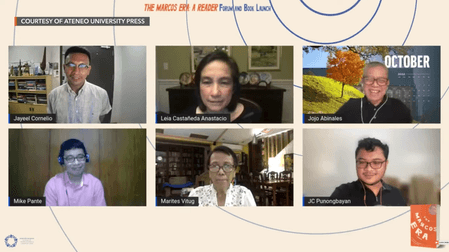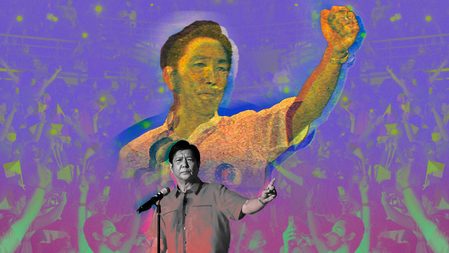SUMMARY
This is AI generated summarization, which may have errors. For context, always refer to the full article.
![[OPINION] On Filipinos’ authoritarian nostalgia](https://www.rappler.com/tachyon/2022/10/tl-authoritarian-nostalgia.jpg)
For my piece this month, I’ve decided to share a snippet from my chapter in The Marcos Era: A Reader, launched last week by the Ateneo de Manila University Press.
The event featured the editors Leia Castañeda-Anastacio and Patricio Abinales, who both talked about the need to continue engaging in conversations about that period. I joined my fellow contributors, journalist Marites Vitug, economist JC Punongbayan, and historian Mike Pante. Available via this link, the launch gave a comprehensive overview of the book, which contains 20 chapters distributed across six sections.
My chapter reflects on Christianity in relation to authoritarian nostalgia, the tacit but lingering disposition among many Filipinos for strongman rule. “The authoritarian past may have only recently emerged as a widespread object of mass nostalgia,” but, according to Bobby Benedicto, “the Filipino people have long been anticipating Marcos’ return.”
In this piece, I’d like to share how pervasive this might be and what its underlying values are.
Democratic ambivalence
Drawing on the Asian Barometer Survey from 2002-2016, a period that predated Duterte’s presidency, Ronald Pernia shows that Filipinos have long embraced authoritarian values. He uses proxy variables to argue his case: willingness to submit to government decisions, resistance towards having too many different views in society, and support for a strong leader.
This is his finding: throughout the four waves of the survey, Filipinos have consistently agreed with these statements.
But there’s so much more to his findings.
It turns out that these scores are positively correlated with public trust in political institutions (such as courts, national government, local government, and Congress). This means that the “authoritarian values” to which Filipinos subscribe are not necessarily anti-democratic.
At the very least, he argues that people’s “concern for stability and harmony” underpins their “support for ‘strong leaders’ who can carry out programs without the need for congressional checks or electoral constraints.”
This suggests that Filipinos have mixed feelings towards democracy.
Without denying the significance of liberty, many Filipinos also seem to be convinced that it needs to be restrained.
Based on interviews with middle class Filipinos, Adele Webb has observed the recurring view that freedom in the Philippines is excessive. For her interviewees, democracy is good, but “there is an element of compliance implied in the notion of democracy as freedom. The onus of compliance is on the individual citizen, to stay within certain boundaries of ‘moral’ behavior.”
They also believe that the only way excessive freedom can be restrained is by having a strong leader.
She then arrives at a disconcerting conclusion: “The exercise of political authority, even if that authority oversteps the boundaries of individual freedoms and liberties, is deemed necessary and acceptable.”
Virtues?
Based on these studies, social order, compliance, and discipline are virtues that underpin authoritarian nostalgia.
There are a few key insights here. For one, to long for strongman rule is not to give up on democracy per se. Institutions are still important and Filipinos would like them to be reliable.
At the same time, social order seems to be among the chief values underlying authoritarian nostalgia. Filipinos have a number of reasons to believe this to be the case, from the pasaway in the streets to the drug users in their neighborhoods.
If this assessment is correct, then inherent to people’s sense of right and wrong is social order.
Webb’s interlocutors above might come from the middle class but many in rural poor communities may in fact echo their viewpoints. The support for the war on drugs, for example, comes from many aspirational breadwinners who are convinced that criminal behavior endangers not just their safety but their very attempt to lead decent lives to improve their fortunes.
In this light, the decisive leadership that President Duterte promised during his campaign in 2016 tapped into people’s anxieties and hopes, turning local concerns for safety into national policy. Thus, even if it entailed violent action on the part of the state, the war on drugs was widely supported; it gave them a sense of social order in their communities.
Religious viewpoints matter here as well.
While many religious entities especially within the Catholic Church resisted the war on drugs and the proposed reinstatement of the death penalty, many others threw their support behind them. Much of this religious worldview, present in Catholic and other Christian circles, takes the battle for social order as ultimately a war between good and evil.
Thus, in this worldview, God needs to appoint a leader who can instill order, compliance, and discipline. There is thus a religious dimension to authoritarian nostalgia.
Blaming the people
A caveat, however. In talking about authoritarian nostalgia, one must not end up blaming the public.
This, sadly, is a common trope, which comes in different forms.
Filipinos are bobotante. Filipinos are easily fooled. They sell their votes. And thus they have no one else to blame but themselves.
These statements are problematic because they present an incomplete picture. As moralistic statements, they fail to recognize the structures that enable authoritarian nostalgia. These are the wider social and political processes that have rendered authoritarian leadership a seductive option for the public.
From inadequate coverage of Martial Law in basic education to the deliberate rewriting of history by the state itself, the political economy of truth has shifted in favor of falsehoods.
To this could be added the role of industries behind disinformation. Not only are they erasing history, which ultimately engenders historical amnesia, but they are actively retelling history by celebrating a mythical past that ended when the forces behind People Power won.
But these statements are also problematic in another sense. This is because the people they blame are usually an imagined Other in the form of the poor and uneducated. In this sense, this trope is not different at all from the pasaway narrative that justifies the need for strongman leadership.
In effect, blaming the public means that Filipinos have no redemption. We are either stupid or pasaway. Either way, we deserve the leaders that we have.
Restraint, therefore, is very much needed in confronting authoritarian nostalgia. Blaming the public will not turn the tide.
But more importantly, authoritarian nostalgia, it must be recognized, is appealing because of the “hope” it promises, at least with respect to social order and discipline. Apart from confronting falsehoods, the challenge for the rest of us in civil society is to offer a far more convincing political vision — one in which national progress rests not on strongman leadership but on the strength of our institutions and collective life. – Rappler.com
Jayeel Cornelio, PhD (TOYM 2021) is the Associate Dean for Research and Creative Work at the Ateneo de Manila University. This piece is derived from his chapter in The Marcos Era: A Reader, edited by Leia Castañeda-Anastacio and Patricio Abinales and published by the Ateneo de Manila University Press. Follow Dr. Cornelio on Twitter @jayeel_cornelio.
Add a comment
How does this make you feel?


There are no comments yet. Add your comment to start the conversation.